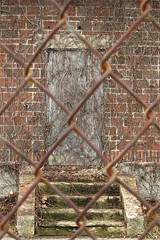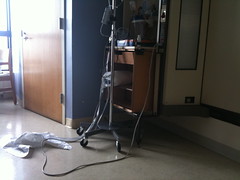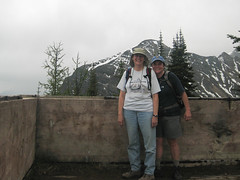Does anyone know how it feels? Absolutely. Many people are in the position I’m in. Logically, I know am not alone in my experience, but, sometimes, I feel terribly alone.

My partner was diagnosed with ovarian cancer this past March. The cancer cells must have been festering, but for our family, her illness began with a cold and then a persistent cough. From the 10,000 foot view, the whirlwind was three long weeks: repeatedly take fluid out of her lungs; she has lung cancer; no, she has stage 4 ovarian cancer; unzip her belly and remove all her “girly parts.” Bam.
From one perspective, the gale force winds have stopped. She’s not in the hospital. The news doesn’t change every day. We no longer live one day at a time, never knowing what will come tomorrow. From another perspective, the winds continue to blow, this way and that. While the news doesn’t change every day, we should live one day at a time, because we don’t know what will come tomorrow.
By early March, her cough wasn’t getting better. She began having trouble breathing after having climbed only one flight of stairs. Her doctor referred her to pulmonary intervention. Always reliable in an emergency, I immediately became The Caretaker.
We went to the doctor’s office together. I checked her in at the desk. I sat through the intake interview and helped answer a few questions. I stood nearby while they stuck in the needle and pulled out over a liter and a half of fluid. From that day on, I paid attention to what the doctors were saying, interpreted complexities for her, and carefully observed how she was feeling. I made doctor’s appointments, figured out how to get us where, when, and kept track of her medications. In the hospital, I helped excellent nurses and doctors keep track of details and patterns, sat with her while she slept, and refilled cups of ice chips. At home, I insisted that we call the doctor, even if it might result in another hospital visit, which might turn into another overnight. Or week.
During March, during the whirlwind, my internal, pragmatic Caretaker was sometimes replaced by The Realist.
This is not a way of life that I have chosen. There has been a fissure, a rupture in our lives. It will never be the same. Life always changes. But this is not a good change. It is bad. Very bad. It isn’t fair. Life isn’t fair.
The emotions swing, in and out: pragmatism vs. “bigger picture” reality; absorbed by daily life details, then overcome by what this cancer really means (as though I actually know).
After the diagnoses, she told her family. I told mine. Over the coming days, we told more and more people. The love and support of friends and family buoyed us. So many helped and so many more offered in so many ways. We are so lucky.
I am lonely. I want comfort. I want someone to understand. I want someone to know how it feels. We are so unlucky.
In March, I became the primary caretaker for two: our eleven year old son also needed attention. I coordinated friends and family to pick him up, drop him off, or stay with him until I came home. I always came home–I didn’t want to disrupt his life any more than it need be. He felt uncomfortable talking, really opening up, to anyone other than me. I became his confidant, helping him understand in his own terms what he needed to, and protecting him from what a child oughtn’t face. Certainly I couldn’t confide in him, but neither could I confide in my partner. For both, I had to be strong.
I don’t mean to overstate my burden. Many have done much more for much longer duration in all sorts of circumstances, not necessarily because of illness. I feel guilty about writing this. I don’t mean to whine. I write to work out why I sometimes wail.

At first, the news hit like a lightning bolt showing me she was going to die. How could our time together be cut short, so suddenly? Soon after that, she could have died not form the cancer itself but during surgery, when they took her away from me for hours and hours. I realized how much my life was bound with hers and our son’s. What would we do without her?
Deep worries and desires like these subside. Then, like a flash flood rushing through a canyon, they carry me away. Struggling to surface, I need something to give me breath.
She hasn’t been in the hospital for months. She takes care of herself, figures out her own drug doses, and works as much as she wants to. The chemotherapy has been very successful. There is every reason to believe that she’ll be fine for a very long time. She neither feels nor acts like a sick person. She is practical, and steadfastly optimistic, already learning how to live with cancer as a chronic disease.
I want someone to realize that my partner having cancer still has an enormous impact on me, as well as on our lives.
I don’t think about “she could die” anymore. But I live with the threat that she could end up in the hospital again: blood pressure, temperature, oxygen saturation, pills, shots, IVs, draining tubes, x-rays, CT scans, MRIs; not knowing where she is in the hospital, when they’re going to be done, or if they’re going to figure out what’s wrong. Not knowing.

By May, life was pretty much back to normal. We were back to being busy working parents, scrambling for time to discuss who was picking up whom, from where, when. On Memorial Day, we walked along with our son’s band in the parade. I left her to go talk to someone across the street. I saw her leaning against a fence, looking tired, but okay. The friend and I walked along together for several blocks. Suddenly, I couldn’t find her. She wasn’t across the street. I couldn’t see her in front of me or behind. The possibilities ran through my head. I wasn’t overcome with panic. I was stepping through: if she had fainted, maybe someone had let her sit in a lawn chair and given her some lemonade. Or, maybe she was in an ambulance. Maybe we would end up sitting for hours in the hospital again. I ran back along the parade route. I called her cell phone: no answer. I found myself in front of our car, so drove it back to the fence where I’d seen her last: she wasn’t there. Finally, I went to the end of the route and there she was, calm as could be, asking where I’d been. Innocently. As if she hadn’t fainted; no one had offered her a sip of refreshing lemonade; the ambulance hadn’t come.
She asked where had I been? But, she was the one in danger.
She doesn’t, can’t, understand how the illness makes me feel. Nobody understands how it makes me feel. The threat is always present; The Caretaker is always aware. The reason I stay calm in the emergency, concentrate on what the doctors are saying, ask careful questions, enable us to make critical decisions, is because I anticipate what will happen next. I have thought through the mights.

In June, we did what we love to do: we hiked up a mountain. Sure, she had a little trouble breathing, but she turned on the “little engine that could” that has always lived inside, and chugged right up. We felt triumphant. I saw life progressing, moving forward slowly but surely.
In July, we were at a Boston Breakers soccer match. Under the blazing sun, in 90 degree heat, she did not feel well. Unaware, I watched my favorite team play. Out of habit, I glanced over at her; I realized I needed to pay her a little attention. Looking pale, she said she wanted the umbrella my sister had offered. Absorbed by the game, I handed it to her, barely looking. Knowing she wasn’t comfortable, I tried to fan her with my roster. I turned back to the game.
Something in my peripheral vision caught my attention. She was standing, about to go down the cement stairs to get out of the sun. In a millisecond, I thought about the cement stairs, and her, being weak from the sun, tripping down, and landing on her head. I jumped up to hold her arm. The further down we went, the more I realized how weak she was.
I should have noticed. I should have gotten her out of the sun earlier.
I fanned her with my hat. The police officer offered water and ice wrapped in a towel. I worked through the possibilities: she was having trouble breathing again, or the chemo was making her more susceptible to heat, or . . . what? She would lie on the stretcher. They would give her oxygen. If they treated her at all, would they be required to take her to the hospital?
I live with the threat that any health issue could turn serious at a moment’s notice. I live with the burden of letting her live her life the way she wants to, yet knowing that she won’t ask me for help until it’s past the time when she needs it, because that’s part of her living her life. She is resolutely self-sufficient, then needy; she tells me I’m nagging, then allows me to help.
I must stay vigilant. I let down my guard to watch my soccer team. I deserved to. I shouldn’t have. I’m supposed to be a caretaker. And I’m not.
Something could happen. She could go to the hospital. Something bad could happen. At any time. It all starts with heat stroke, breathing with difficulty. Anything.
My fear is always here. Lurking. I seem to live with it, ignorantly, as a hiker unaware that hard rain in a canyon may bring flash floods.
 And then the rains come. The canyon floods.
And then the rains come. The canyon floods.
Please, someone, help me breathe.
I know you’re out there. I know you know how it feels.
Caveat
I’ve hemmed and hawed about whether to post this on my blog. Is it too personal? Will people feel pity? Ultimately, I’ve decided to post it because I hope there are people out there who will read what I’ve written and think, “I know what you mean.” I don’t want pity. Don’t feel sorry for me. There are many pains in the world. This is just one
Also see Cancer Journey, on Flickr.

Brilliant piece, Kim. We all know that you're going through this just as muh as your other half is, but it's very helpful to to hear your own thoughts.
I've said it before and I'll say it again: she is unbelievably lucky to have you in her life.
Kim, your writing brings me in so I must say I know a little about caretaking, and yet everyone is different. So well told, your complete openness is an inspiration and so compact. Thank heavens you have the gift of writing for this, and every, experience. So much insight and heart.
Hi, Kim –
I've just finished a book by Gail Sheehy called Passages in caregiving : turning chaos into confidence. If anyone could make you feel not alone in your journey, it will. She spent 17-years with her husband and his on-and-off battle with cancer, and it is both a deeply personal journal and a nonfiction way of framing the experience. especially the roller-coaster effect of chronic cancer. We are wishing you all the best.
– Darcy and Bob
Kim,
Thank you for posting such well-matured, poetically expressed thoughts. Besides really "getting" the story, we get wisdom and beauty as a result of your care.
I hope it feels right and helpful to you to be understood and heard. For many of us, that is an important thing, and you especially deserve it.
– Andy
Hey Kim,
I just came across this piece today and wanted to let you know how much it reverberated in my soul. I just crossed my 1.5 year mark as a breast cancer survivor and am so thankful for my wonderful husband who was my rock and caregiver during the worst of times. I'm sure he felt much the same way. Your writing talents are allowing others to see through a window without actually having to experience this kind of situation. Your writing will mean a lot to many in the time to come. Thank you for sharing.
Celeste
I know exactly how you feel. Yes, it is lonely. Yes, the fear is constantly there, in the background. The only way you know you are in the 80% who survive 10 years is look back after 10 years and say "I'm still here", and there is no way to know if that is going to happen.
We've just been through it, and I've been the caretaker. I know exactly how you felt, and feel, and we have yet to achieve anything approaching "normalcy" in our lives. We may never.